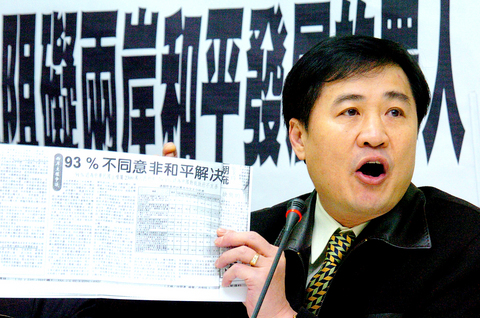The public should take to the streets on March 26 to vent resentment over China's "anti-secession" law, leaders of the Democratic Progressive Party (DPP), the Taiwan Solidarity Union (TSU) and pro-independence groups said yesterday in response to the law passed by China's parliament.
"The scenario we were most worried about happened," DPP Chairman Su Tseng-chang (
"China not only passed that law but also retained the words "non-peaceful" which indicates the manner China will take to deal with Taiwan," he said.

PHOTO: SEAN CHAO, TAIPEI TIMES
"The so-called anti-secession law does not conform to democratic trends at all." Su said. "As many as 93 percent of Taiwanese people are opposed to the law. Why is it that China cannot respect the will of the 23 million people of Taiwan, while it claims it has to respect the will of its 1.3 billion people?"
"I urge every citizen in Taiwan to make sure they join in the massive march on March 26 to show our antipathy to that law," Su said.
Su made the remarks yesterday morning after going to the Hong Shee Villa in Taoyuan County to visit former president Lee Teng-hui (
According to Su, Lee promised to participate in the march and will ask the Taiwan Solidarity Union (TSU) to help mobilize supporters to take to the streets in Taipei on that day.
However, while speaking with Su, Lee suggested that President Chen Shui-bian (
When asked whether Chen would join the march, Su said that Chen had publicly urged the public to participate and that people could expect him to be there.
The TSU's head commented further on Lee's suggestion.
"It is somehow strange for President Chen to walk on the street in his capacity as head of state," TSU Chairman Shu Chin-chiang (
Shu also stressed that the TSU would not spare any effort in supporting the DPP's march.
Later yesterday afternoon, Su visited Tai Pao-tsun (
Tai agreed to attend, while Wang said he would choose one of the activities to be held on March 26, since China's legislation was unacceptable to every Taiwanese citizen, including those in the Chinese Nationalist Party (KMT).
"We [the KMT] will first voice our opposition against China's legislation at the rally on Saturday that aims to ask for the truth about the March 19 shooting incident," Wang said.

Alain Robert, known as the "French Spider-Man," praised Alex Honnold as exceptionally well-prepared after the US climber completed a free solo ascent of Taipei 101 yesterday. Robert said Honnold's ascent of the 508m-tall skyscraper in just more than one-and-a-half hours without using safety ropes or equipment was a remarkable achievement. "This is my life," he said in an interview conducted in French, adding that he liked the feeling of being "on the edge of danger." The 63-year-old Frenchman climbed Taipei 101 using ropes in December 2004, taking about four hours to reach the top. On a one-to-10 scale of difficulty, Robert said Taipei 101

Nipah virus infection is to be officially listed as a category 5 notifiable infectious disease in Taiwan in March, while clinical treatment guidelines are being formulated, the Centers for Disease Control (CDC) said yesterday. With Nipah infections being reported in other countries and considering its relatively high fatality rate, the centers on Jan. 16 announced that it would be listed as a notifiable infectious disease to bolster the nation’s systematic early warning system and increase public awareness, the CDC said. Bangladesh reported four fatal cases last year in separate districts, with three linked to raw date palm sap consumption, CDC Epidemic Intelligence

Two Taiwanese prosecutors were questioned by Chinese security personnel at their hotel during a trip to China’s Henan Province this month, the Mainland Affairs Council (MAC) said yesterday. The officers had personal information on the prosecutors, including “when they were assigned to their posts, their work locations and job titles,” MAC Deputy Minister and spokesman Liang Wen-chieh (梁文傑) said. On top of asking about their agencies and positions, the officers also questioned the prosecutors about the Cross-Strait Joint Crime-Fighting and Judicial Mutual Assistance Agreement, a pact that serves as the framework for Taiwan-China cooperation on combating crime and providing judicial assistance, Liang

US climber Alex Honnold left Taiwan this morning a day after completing a free-solo ascent of Taipei 101, a feat that drew cheers from onlookers and gained widespread international attention. Honnold yesterday scaled the 101-story skyscraper without a rope or safety harness. The climb — the highest urban free-solo ascent ever attempted — took just more than 90 minutes and was streamed live on Netflix. It was covered by major international news outlets including CNN, the New York Times, the Guardian and the Wall Street Journal. As Honnold prepared to leave Taiwan today, he attracted a crowd when he and his wife, Sanni,